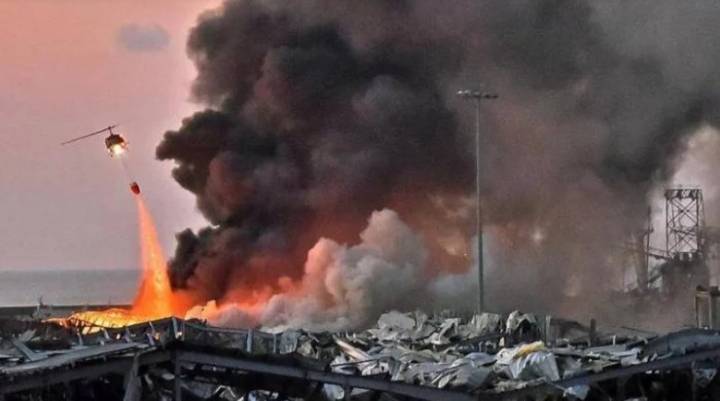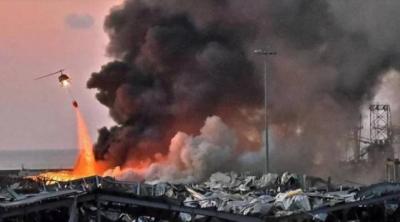The Lebanese state is unable to confront a storm, let alone an earthquake. It will definitely not be able to rise to the responsibility placed upon it in such circumstances, due to several reasons, including the lack of emergency plans and financial, logistical, and human resources; what happened during the Beirut port explosion is a clear testament to that! The "International Information" prepared a report revealing the state's weakness in facing disasters in Lebanon. According to the report obtained by the newspaper "Nidaa al-Watan", in 1975, the Council of Ministers decided to form a Supreme Relief Authority and specified its tasks under decision 35/1 dated 17/12/1976. Its tasks were amended in 1997 as follows:
**Tasks of the Relief Authority**
- Accept donations (food and life supplies) offered to the Lebanese state to aid the affected.
- Accept various types of donations to the Lebanese state from countries, organizations, international and regional bodies, local entities, and both legal and natural persons to aid the affected.
- Establish the necessary regulations for receiving and distributing the aforementioned donations.
- Administrative and financial tasks.
- Preparatory and logistical tasks - such as receiving donations, ensuring their transport, and storing them.
- Distribution of donations.
- Statistics and information.
- Securing the necessary funds to ensure operations.
- Approving a financial system for the Authority's operations.
- Assistance from any public administration and public institution employees for this purpose.
- Managing disaster affairs of all kinds.
- Any relief matters referred to it by the Council of Ministers.
**Limitations on the Authority’s Tasks**
Here, researcher Sadiq Alawieh from "International Information" points out to "Nidaa al-Watan" that "despite the fact that Article 8 of the aforementioned decision stipulated that the Supreme Relief Authority be considered the sole official body responsible for relief operations, successive governments, instead of assigning the Supreme Relief Authority with disaster risk management, limited its tasks to matters not related to relief at times." Most of these tasks mainly consisted of merely providing cash compensations including:
- Cash assistance for those affected by explosions.
- Cash assistance for those affected by riots.
- Cash assistance for those affected by natural disasters.
- Compensation for the owners of vehicles (compensation for vehicles operating on diesel).
- Assistance in the field of public health.
- Assistance in ensuring public safety.
- In-kind assistance or cash assistance to implement specific relief projects for reconstruction.
- Paving and executing road works and support walls.
- Compensation payments for owners of housing units damaged due to the July aggression.
**Governments Did Not Learn from Experiences**
The report notes that "in 2010, the Prime Minister established a national committee under decision 103/2010 to develop an emergency plan to face disasters." It adds that "a Disaster Risk Management Unit was established at the Presidency of the Council of Ministers through a project to enhance the Lebanese government's capacity to reduce disaster risks in 2010 in partnership between the Lebanese government and the United Nations Development Programme. The mentioned unit defines its role as handling several tasks, the first being receiving reports of disasters."
The report highlights that "governments have not made any efforts to learn from past experiences and tragedies that the country has undergone to create a national coordination plan that oversees pre-disaster planning and not post-disaster, assigning it to an official body instead of a temporary unit named the Disaster Reduction Unit. Notably, in 2013, another committee was formed chaired by the Secretary-General of the Higher Defense Council with several director generals as members, and the Secretary-General of the Supreme Relief Authority serving as the rapporteur."
**Swiss Donation**
It points out that "in 2014, a contract was signed between the Presidency of the Council of Ministers and a Swiss company, accepting a financial donation to support disaster risk management valued at 489,000 Swiss francs, equivalent to 834,967,000 L.L. as a contribution to support disaster risk management."
**Civil Defense Duties**
Meanwhile, the Civil Defense tasks, according to its system and organization (Decision Number 50/1967), include preparing means to mitigate losses in lives and property and limit them in cases of war and natural disasters in addition to:
- Evacuating residents and providing shelter and livelihood.
- Continuously training civilians in civil defense activities and subjecting them to necessary drills.
- Clearing dangerous or threatened areas.
- Demolishing buildings at risk of collapse.
Alawieh stresses that "the issue of disaster management is absent from the Lebanese administration system and is not among its concerns as it considers that all it does is distributing cash donations to the families of the victims, whereas there should be management based on the principle of disaster reduction and mitigation."
Thus, Alawieh emphasizes that it is not only the duty of the Supreme Relief Authority to provide cash donations to the victims' families, but it is also its responsibility to save people so they do not become victims; that is, an authority which counts those rescued, not the victims." He questions, "Did the Lebanese government learn from what happened in the port explosion and benefit from its experience to avoid repeating what occurred in terms of the loss of the crime and explosion site and neglecting the victims? People die due to the lack of anyone to save them," to which he responds: "Apparently, it will not learn."
**No Plans or Projects!**
The report also notes the "lack of governments to create plans or allocate specific amounts for the Supreme Relief Authority to implement projects in the framework of planning to confront disasters before they happen, aside from allocating amounts to provide cash after the disasters and accepting donations of various types offered to the Lebanese state from countries, organizations, international and regional bodies, local entities, and both legal and natural persons to aid the affected."




